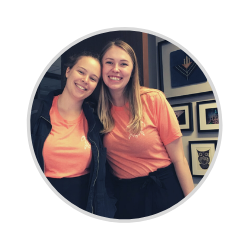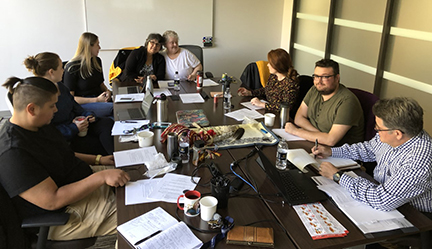U of T Law alumni and students advocate at Aboriginal Legal Services
30 years of connection
by Nina Haikara
Métis lawyer, Amanda Carling (JD 2012), served on the board of directors for Aboriginal Legal Services (ALS), formerly ALS of Toronto, for over a decade. But it was much more than just a volunteer appointment.
“What I enjoyed most about being of service to ALS, was the introduction it gave me to some of the most talented, wise, kind and dedicated Indigenous people in Toronto,” says Carling, who in 2016 joined the University of Toronto’s Faculty of Law to lead its Indigenous Initiatives Office (IIO).
“I grew up in Winnipeg and didn’t know anyone when I moved here for law school. My fellow board members, the staff and managers of ALS became my teachers, my mentors, my Aunties and my closest friends. To support the good work done by the staff, even in a small way, was incredibly rewarding.”
Carling was recruited by Aaron Mills (JD 2010) to join the board and says she continues to be mentored by former board members Maggie Wente (LLB/MSW 2002) and Marisha Roman (LLB 1994).
“That learning, and those relationships, have been invaluable to me over the last 10 years. I think U of T Law recruits from the Indigenous Law Students Association because there’s a natural reciprocity that comes with service to the board,” says Carling, adding that U of T Law students have the skills, intelligence and dedication to be excellent board members.
“They’re often coming from outside Toronto’s diverse urban Indigenous community. Service on the ALS board for many is a door into a strong and supportive community. ALS alumni – staff and directors – are supportive and offer a kinship network that many of us leave behind when we come to the big city to attend law school.”

As a Gerald W. Schwartz Fellow, Jessie Stirling (Wa’ya T’so-la), who completed her JD and Certificate in Aboriginal Legal Studies in 2020, was invited to spend a summer researching and writing on wrongful convictions of Indigenous and other racialized people in Canada. The work was part of an ongoing project, the Canadian Registry of Wrongful Convictions, led by Professor Kent Roach and Carling.
Carling asked if Stirling would have any interest in joining the ALS board.
“My volunteer work had been exclusively within the law school bubble at that point. I was looking to venture outside of that,” says Stirling, who is a Kwakwaka’wakw woman and a member of the Wei Wai Kum First Nation located on the east coast of Vancouver Island.
“To get an education in non-profit board governance while serving [Indigenous] communities throughout Ontario – it is just the biggest reward.”
In 2018, Stirling became a shadow member of the ALS board. The position had been created to provide those interested in serving on the board, some idea of what the work would be like before committing to a role. After serving on the board for two-and-a-half years (including one year of service as the board secretary), Stirling became board chair and president after Carling stepped down.
“It was definitely a big task to take on after graduation and in the middle of my articles, but I was really excited and honoured to be able to step up for the board and the organization in this way,” says Stirling, who is currently articling with the Office of the Children’s Lawyer, an independent branch of the Ministry of the Attorney General.
"[Carling] was the reason I wanted to join the ALS board. Your first few months on the board, it’s really hard to get your feet under you, but I stuck with it because I was just so impressed with her leadership and I wanted to learn more from her,” says Stirling.
Earlier this year, Stirling was named a recipient of the President’s Award for the Outstanding Indigenous Student of the Year (graduate/professional category) for her exemplary academic achievement, steadfast advocacy of Indigenous interests and extraordinary contributions to the Indigenous community.
"I would encourage students to look for opportunities to engage with and serve a community that you're connected to, or interested in. It is really rewarding.”

Carling was also Branden Cave’s (JD 2022) introduction to the ALS board. He expressed an interest in learning more about Indigenous governance practices, so Carling invited Cave to observe a board meeting. He’s now serving as board secretary.
"When I first went to a meeting, that was when I met Jessie [Stirling] and Leslie Anne [St. Amour, JD 2020] for the first time. They told me there is this large contingent of alumni and students at ALS, so it's nice to be part of that."
Cave is non-Indigenous. He grew up in rural Alberta where he says there was little exposure to Indigenous culture. As a student leader at the University of Calgary, Cave says he was involved in approving the institution's Indigenous Strategy, ii' taa'poh'to'p. His experience in student governance sparked his interest in studying law.
"The interesting thing for me has been realizing that a lot of the ways that I view governance are so heavily rooted in the colonial and Western experience," says Cave.
"I think the way we need to move forward as Canadians, and in the governance realm especially, is to incorporate more Indigenous practices. It’s my goal to learn more about Indigenous governance, to help those organizations where I can and to help propagate Indigenous governance practices.”
Cave, who sees pro bono governance and non-profit work in his future, says the OnBoard program was among his top reasons for choosing U of T Law. He hopes to enrol in the non-profit governance course next year.
“My lived experience isn't that of the people in the Indigenous community, who need the assistance and look to ALS as a leading organization. But where I do have my skills, I want to contribute,” says Cave.
“Access to justice gets reinforced when you're outside the law school, where not everybody's a legal expert."
As Stirling explains, ALS is split into two distinct legal entities: ALS - Legal Clinic and ALS Inc. Despite the split, ALS continues to operate as one organization, governed by a board of 10 volunteer directors focusing on governance, policy, finance, fundraising and membership.
ALS Inc., led by program director Jonathan Rudin, is responsible for community engagement and organizing programs and services of need, such as Gladue writers, who prepare Gladue reports that detail an Indigenous person’s lived trauma and experience with the justice system and can be considered by the courts when sentencing, to community council and talking circles. The ALS speciality legal clinic is funded by Legal Aid Ontario (LAO), and overseen by legal director, Christa Big Canoe (LLB 2005).
“Having U of T Law students work in the clinic infuses fresh ideas and approaches to providing innovative services to Indigenous clients and community. Students have assisted us in increasing the means and manner in which we provide legal information and identifying emerging technology, avenues and ways to communicate to our community about their rights,” says Big Canoe. She adds that 3L students Lilly Gates and Katelyn Johnstone are currently supporting the Suitcase for Kids project that aims to support Indigenous youth who are aging out of the child welfare system at age 18 in Ontario.
“We hope to provide youth with suitcases, and provide resources, virtual or physical, so they can pack their possessions with pride and have knowledge of available supports when they age out of care,” says Johnstone.
ALS Staff lawyer, Doug Varrette (JD 2017), is Algonquin from the Ottawa Valley.
He says ALS is one of the few ethnolinguistic legal clinics in Ontario to serve only Indigenous clients.
"A lot of the work we do tends to be very expansive stuff that many other legal aid clinics will never work on, like a coroner's inquest. ALS is unique in that perspective, I think, because we're looking at the broad Indigenous community with our advocacy and have different opportunities than other public interest organizations."
Varrette held a June Callwood fellowship at ALS following his first year at U of T Law. He returned, for a third-year clinic placement and then his articles, before taking a full-time staff role.
"When I open a file that's existed for a long time, or pick up an old factum, you're seeing people who went to U of T,” say Varrette.
“You just pick-up the advocacy that we've been doing for 30 years now.”
Roach and then legal director Kimberly Murray, now Ontario’s first Assistant Deputy Attorney General for Aboriginal Justice, were solicitors for ALS in R. v. Gladue (1999) that laid the groundwork for Gladue reports.
Varrette explains the Supreme Court affirmed that the Criminal Code required sentencing to consider Indigenous background. After the decision, the Indigenous community and organizations like ALS established the process for Gladue reports and fought to have them accepted in courts, as well as founding a Gladue court in Toronto.
“I know the work [Roach] has done, as it impacts Indigenous people. You can see the cases that were worked on and how that has become a major precedent that we use today."
Those who follow Varrette’s footsteps to ALS will also be informed by his work.
“When we go to the Supreme Court, we say, ‘This is what our clients are saying.’ It's coming from a place of understanding. We've lived those experiences with our clients.
“That’s advocacy.”